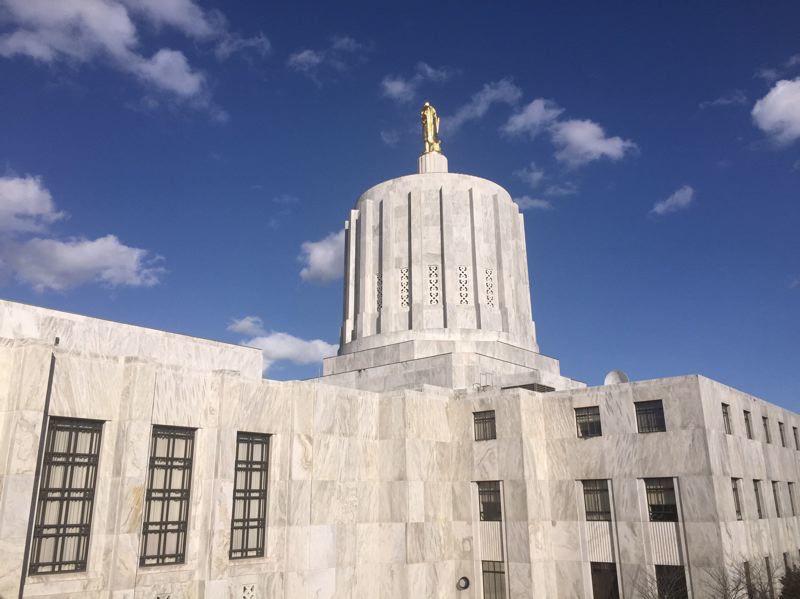Oregon politics: March arrives with virus, voting and political turmoil
Published 10:15 am Tuesday, March 2, 2021

- The Oregon State Capitol.
“In like a lion, out like a lamb” may be true for March weather, but the saying is unlikely to apply to this month’s political scene in Oregon. Percolating political issues could make the end of the month more like a shark than a sheep.
Capitol in virus hot zone
Trending
The Legislature returns to Salem this week, with the Senate and House each meeting once in the Capitol. The statehouse is in the middle of the 97301 zip code, which has the highest number of COVID-19 cases since the pandemic began: 3,362.
Last week, it was No. 2 in new cases at 65. The Legislature has only met a handful of days since the first virus case was reported in Oregon on Feb. 28, 2020. But the calendar gets busier this month with an average of two floor sessions a week. In April, there is no cap on meetings.
So far, there are no reported infections among Oregon’s 60 House and 30 Senate members. Through Feb. 25, there have been 177 state officeholders around the country who have been infected with COVID-19, with eight deaths.
Walkout worries
Democrats have supermajorities in both the House and Senate to pass legislation, including taxes without Republican votes. But for a third straight year, the specter of GOP walkouts over anything they don’t like hangs over the Capitol. Republicans boycotted the Senate floor session last Thursday, denying a quorum to do any business.
Oregon is one of only four states that require more than a majority of lawmakers to be present to constitute a quorum. Oregon requires two-thirds of lawmakers which two-thirds of members must be present to do any business. That’s 20 out of 30 senators. Democrats hold 18 seats.
Trending
“We cannot normalize the behavior of people walking off the job,” House Speaker Tina Kotek, D-Portland, said during a press call on Monday. “It was bad in 2019 when this happened. It was bad in 2020. It’s deplorable that it’s happening now, again, in the middle of a crisis.”
Republicans made the surprise move without telling Senate Democrats or the House Republican caucus. In a letter to Gov. Kate Brown, the 11 Republicans said they were absent to protest her extension of an emergency order that allows her to decide if businesses and schools are open or closed.
Currently, the only weapon that Democratic leaders have is minor financial fines and withholding per diems for expenses. A resolution to change the constitution to make a majority the minimum for a quorum has been introduced this session. Even if it won legislative approval, the change in the constitution would have to be referred to votes. The earliest the change could go into effect would be 2022.
With battles over the budget, taxes, guns, environmental issues, vaccines, housing aid, and police reform expected to come up for votes, Kotek said there is concern that Republicans will depart again to derail majority rule. No lawmaker will be up for election again until 2022, leaving the status quo likely in place for the session this year and next.
No VIP pass
Oregon lawmakers are getting or asking for special access to vaccinations for COVID-19. The Legislature is part of the “essential worker” group that will be eligible May 1. Some lawmakers can get vaccinated earlier as qualifying under currently eligible groups such as health care workers or those age 65 and older. Colorado is the only state that has inoculated legislators as part of a “continuity of government” effort. In Oregon, Gov. Kate Brown has also yet to receive vaccine. Though Brown would likely qualify for an exemption under CDC rules, she would qualify under the same essential worker category as the Legislature.
Blankenship testifies on redistricting headaches
Local officials will have to scramble to deal with the fallout of the long delay in reapportionment of political districts, Deschutes County Clerk Nancy Blankenship testified last week before the House Redistricting Committee.
Blankenship appeared in her role as co-chair of the legislative committee of the Oregon Association of County Clerks. The 2020 Census data to redistrict legislative and congressional maps for the 2022 election won’t arrive until September, six months past the federal deadline. The COVID-19 pandemic made gathering population data difficult. The delay means the Oregon Supreme Court will decide whether the Legislature, secretary of state or courts will draw the new maps.
The process is always politically charged, especially this year with Oregon expected to get a sixth congressional district, the first change in delegation size in 40 years.
Blankenship submitted a letter with detailed requests from the clerks’ group. It asked lawmakers to consider the impact of their decisions on a long list of related but often overlooked impacts on items such as community college, library, and other local panels.
The best route to less turmoil is simplicity and transparency, Blankenship testified.
“We would urge avoiding, whenever possible, dividing cities by federal and state legislative district lines, especially smaller cities,” she said. “In the event that cities must be divided, consideration of city council districts, city urban growth boundary, county boundary, school districts and other affected communities of interest should be taken into consideration before confusing divisions are adopted.”
Before any final decision was made, she asked that county officials get a chance to look at the maps and raise possible conflicts before the decisions are finalized.
“Allow county elections officials time to provide feedback and clarification to the legislature on proposed changes as we may be able to provide answers that help avoid mistakes from being made,” she said.





